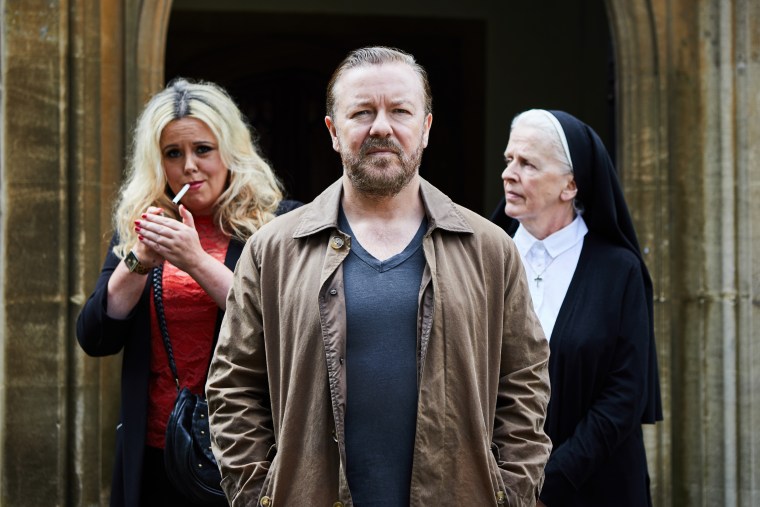Ricky Gervais occupies an odd space in American culture. Most Americans know him due to “The Office” — but the U.S. version, which he produced, and not the original British version, which he co-created and starred in. Though his show “Extras” was well-received, and he’s hosted the Golden Globes multiple times, Gervais has become the type of comedian who is overshadowed by his own controversial persona — and found himself in trouble for it more than once. In his newest series on Netflix, “After Life,” he works hard to turn this somewhat negative development into a positive, with mixed results.
Though his show “Extras” was well-received, and he’s hosted the Golden Globes multiple times, Gervais has become the type of comedian who is overshadowed by his own controversial persona.
Gervais’ comedic work initially drew from a particular type of middle-class insecurity that’s common in the U.K. (One of the reasons “The Office” was able to translate across cultures is because this insecurity is common in paper-pushing offices.) This theme runs through pretty much all of his British work, even in more sentimental series like Channel 4’s “Derek.”
As Gervais has pushed further into U.S. markets, however, his comedy has become less about class consciousness and more about things like political correctness. His stand-up routines push the limits of cringe comedy; his last one “Humanity” (also released on Netflix) felt almost like a libertarian manifesto. For some it’s genius, for others it’s akin to standing atop the course of history and hurling insults at it.
Gervais uses this persona as the jumping off point for his newest series. In it, Gervais plays Tony, though he might as well be playing Ricky. Tony’s wife passed away from cancer sometime before the show starts and I wouldn’t recommend the early episodes to anyone who has dealt with deep grief and/or suicidal ideation. Indeed, Tony initially spends a good amount of time waxing poetic about suicide, pushing the limits of uncomfortable humor. Narcissistic to the point of callousness, cruel to family, friends and coworkers, Gervais’ character goes around boasting that his refusal to conform to society’s niceties is some sort of superpower.
At times he seems to have a point. When two hoods stop him on the street and try to rob him, his response takes them by surprise, as does his willingness to take it farther than they are. At other times, Tony’s angry, stream-of-consciousness rants feel more like the humor of “The Office.” His character is a local journalist of sorts, doing human interest stories for a free paper. Tony’s behavior plays exactly as it’s supposed to during meetings and during interviews with unsuspecting locals who are just pleased to have their picture in the paper.
But a funny thing happens on the way to Angryville. It almost seems like Gervais is aware many viewers won’t see much daylight between his real-life persona and the character he’s playing, and so he tries to use the latter to soften the former. Suddenly, jarringly, the series slides in the other direction, and the entire production turns to discussions of grief, hope and rebuilding. The result is a somewhat weird and wild ride as the show veers from intensely ugly and vicious to downright maudlin, all strung together with vaguely pleasant montages set to a particular strain of 1980s American rock.
Once in a while, all the pieces come together, and the show turns into a bittersweet comedy about the fleeting nature of life. The bad news is the show is short (six episodes), so the parts that don’t work carry a lot of weight. The good news is each episode is only 30 minutes, so the jarring sections are at least semi-brief.
Overall, the series seems to hope that handing out doses of the “The Office” humor will get people to stick around long enough to discover a kinder, gentler version of Ricky — by way of Tony. And like grief, the show does (mostly) get better. It helps that Gervais has surrounded himself with a brilliant supporting cast, including David Bradley as his aging father in a nursing home, Penelope Wilton as a fellow bereaved struggling with the loss of her husband and Ashley Jensen, who gets some of the best lines of the entire series.
It’s quite possible “After Life” is an attempt to rehabilitate Gervais heading into the 2020s. After all, his multimillion-dollar deal with Netflix suggests we’ll be seeing a lot more of him. The streaming service has already ordered a follow-up special to “Humanity,” and chances are Gervais will also give Netflix a chance to bid on whatever TV series he comes up with next. Maybe Gervais thinks he can convince us he’s really a lovely guy underneath all the gruff, sardonic jokes. But I wouldn’t bet on it.

